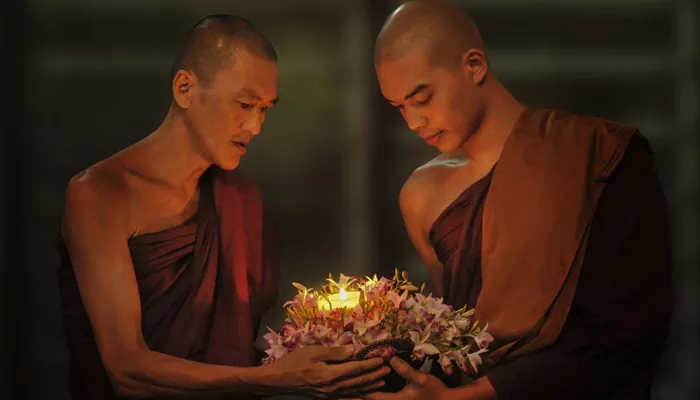Theravada Buddhism is one of the oldest branches of Buddhism. It focuses on the teachings of the historical Buddha, Siddhartha Gautama. Theravada means “Teaching of the Elders” or “School of the Elders.” This school of Buddhism is widely practiced in countries like Sri Lanka, Thailand, Myanmar, Laos, and Cambodia.
To understand whether Theravada believes in God, it is important to look at its origin, meaning, and core teachings. Theravada Buddhism origin gives us clues about how it views divine beings and gods.
Theravada Buddhism Meaning and Core Beliefs
Theravada Buddhism meaning is rooted in the original teachings of the Buddha. It emphasizes the path of personal enlightenment through moral behavior, meditation, and wisdom. The ultimate goal is to reach Nibbana (Nirvana), which means liberation from suffering and the cycle of rebirth.
Unlike some other religions, Theravada Buddhism does not focus on the worship of gods. Instead, it teaches that all beings are responsible for their own actions (karma) and must work on their own spiritual progress.
The Role of God or Gods in Theravada Buddhism
Theravada Buddhism acknowledges the existence of gods, but it does not treat them as all-powerful creators or eternal beings. These gods, often called devas, are considered powerful but still mortal. They live in higher realms but are subject to the laws of karma and rebirth, just like humans.
In Theravada texts, gods are not central to the path of enlightenment. The Buddha himself never claimed to be a god, nor did he instruct followers to pray to gods for salvation. Instead, the emphasis is on understanding the Four Noble Truths and following the Noble Eightfold Path.
Is There a Creator God in Theravada?
Theravada Buddhism denies the concept of a creator God. The universe is seen as without a beginning or an end, operating on natural laws like karma and dependent origination (paticca samuppada). There is no supreme being who created everything or controls the fate of beings.
This view is different from theistic religions where God is all-powerful, all-knowing, and eternal. In Theravada, the focus is on self-effort and wisdom to overcome suffering, not on divine intervention.
The Importance of the Buddha in Theravada
The Buddha in Theravada is a human being who attained full awakening. He is respected as the teacher and guide but is not worshiped as a god. The Buddha’s teachings (Dhamma) and the community of monks (Sangha) form the three jewels that followers take refuge in.
Buddha vs. God
Unlike God in many religions, the Buddha did not claim divinity or demand worship. He encouraged people to verify his teachings by their own experience. The Buddha is honored as an enlightened teacher who showed the path but is not a creator or eternal god.
Theravada and Devotional Practices
Some people may confuse Theravada Buddhism’s devotional practices as worship of gods. In reality, acts like making offerings, chanting, or bowing are expressions of respect and gratitude. These practices help cultivate humility and focus the mind but do not imply belief in an all-powerful God.
Devotion to the Buddha and Monks
Devotion is mostly directed toward the Buddha and the monastic community, not gods. This devotion is meant to inspire ethical living and spiritual effort rather than seeking help from supernatural beings.
Theravada Buddhism History and Its View on God
The Theravada Buddhism history shows that from the start, this tradition did not promote the belief in a creator God. Early Buddhist councils focused on preserving the Buddha’s teachings, which clearly avoided theism.
Throughout history, Theravada monks and scholars have maintained this non-theistic stance. They focus on study, meditation, and ethical behavior to reach liberation.
Comparison with Other Buddhist Traditions
Other Buddhist schools like Mahayana and Vajrayana have more ritualistic and devotional elements, sometimes including celestial beings and bodhisattvas. However, even in those traditions, the idea of a creator God is not central.
Theravada stands out for its strict adherence to the original teachings, which are clear that enlightenment comes from individual effort, not from a god’s grace.
Summary of Theravada’s Position on God
- Theravada Buddhism does not believe in a creator God.
- It acknowledges gods (devas) but they are not eternal or omnipotent.
- The Buddha is a teacher, not a god, and his teachings guide the path.
- Devotional acts are expressions of respect, not worship of God.
- Personal effort and wisdom lead to liberation, not divine help.
Frequently Asked Questions
Does Theravada Buddhism reject the idea of gods completely?
No, Theravada recognizes gods or devas but sees them as beings still trapped in the cycle of rebirth. They do not create or control the universe.
Can a Theravada Buddhist pray to God for help?
Praying to a creator God is not part of Theravada practice. Instead, followers meditate, reflect on the teachings, and work on self-improvement.
Is the Buddha considered a god in Theravada?
No, the Buddha is respected as an enlightened human teacher who showed the way to freedom from suffering.
Conclusion
Theravada Buddhism offers a clear answer: it does not believe in God as an all-powerful creator. It accepts the existence of divine beings but places them within the natural law of karma. The focus remains on individual effort, ethical living, and meditation to achieve enlightenment.
Understanding this helps avoid confusion between Buddhism and theistic religions. Theravada teaches that freedom from suffering is found within, not through worship of a god.

